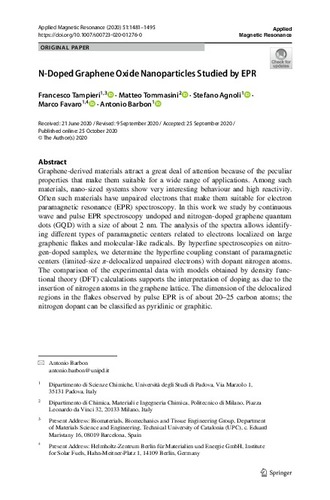Mostra el registre d'ítem simple
Do I have a personality? Endowing care robots with context-dependent personality traits
| dc.contributor.author | Andriella, Antonio |
| dc.contributor.author | Siqueira, Henrique |
| dc.contributor.author | Fu, Di |
| dc.contributor.author | Magg, Sven |
| dc.contributor.author | Barros, Pablo |
| dc.contributor.author | Wermter, Stefan |
| dc.contributor.author | Torras, Carme |
| dc.contributor.author | Alenyà Ribas, Guillem |
| dc.contributor.other | Universitat Politècnica de Catalunya. Doctorat en Automàtica, Robòtica i Visió |
| dc.contributor.other | Institut de Robòtica i Informàtica Industrial |
| dc.date.accessioned | 2021-02-01T12:23:28Z |
| dc.date.available | 2021-02-01T12:23:28Z |
| dc.date.issued | 2020-10-22 |
| dc.identifier.citation | Andriella, A. [et al.]. Do I have a personality? Endowing care robots with context-dependent personality traits. "International journal of social robotics", 22 Octubre 2020, vol.13, p.2081-2102 |
| dc.identifier.issn | 1875-4805 |
| dc.identifier.uri | http://hdl.handle.net/2117/336278 |
| dc.description.abstract | Recent studies have revealed the key importance of modelling personality in robots to improve interaction quality by empowering them with social-intelligence capabilities. Most research relies on verbal and non-verbal features related to personality traits that are highly context-dependent. Hence, analysing how humans behave in a given context is crucial to evaluate which of those social cues are effective. For this purpose, we designed an assistive memory game, in which participants were asked to play the game obtaining support from an introvert or extroverted helper, whether from a human or robot. In this context, we aim to (i) explore whether selective verbal and non-verbal social cues related to personality can be modelled in a robot, (ii) evaluate the efficiency of a statistical decision-making algorithm employed by the robot to provide adaptive assistance, and (iii) assess the validity of the similarity attraction principle. Specifically, we conducted two user studies. In the human–human study (N=31), we explored the effects of helper’s personality on participants’ performance and extracted distinctive verbal and non-verbal social cues from the human helper. In the human–robot study (N=24), we modelled the extracted social cues in the robot and evaluated its effectiveness on participants’ performance. Our findings showed that participants were able to distinguish between robots’ personalities, and not between the level of autonomy of the robot (Wizard-of-Oz vs fully autonomous). Finally, we found that participants achieved better performance with a robot helper that had a similar personality to them, or a human helper that had a different personality. |
| dc.language.iso | eng |
| dc.publisher | Springer |
| dc.rights | Attribution-NonCommercial-NoDerivs 3.0 Spain |
| dc.rights.uri | http://creativecommons.org/licenses/by-nc-nd/3.0/es/ |
| dc.subject | Àrees temàtiques de la UPC::Informàtica::Robòtica |
| dc.subject.lcsh | Robotics |
| dc.subject.lcsh | Artificial intelligence |
| dc.title | Do I have a personality? Endowing care robots with context-dependent personality traits |
| dc.type | Article |
| dc.subject.lemac | Robòtica |
| dc.subject.lemac | Intel·ligència artificial |
| dc.contributor.group | Universitat Politècnica de Catalunya. ROBiri - Grup de Robòtica de l'IRI |
| dc.identifier.doi | 10.1007/s12369-020-00690-5 |
| dc.description.peerreviewed | Peer Reviewed |
| dc.relation.publisherversion | https://link.springer.com/article/10.1007%2Fs12369-020-00690-5 |
| dc.rights.access | Open Access |
| local.identifier.drac | 30432695 |
| dc.description.version | Postprint (published version) |
| dc.relation.projectid | info:eu-repo/grantAgreement/MINECO/2PE/MDM-2016-0656 |
| dc.relation.projectid | info:eu-repo/grantAgreement/EC/H2020/741930/EU/CLOTH manIpulation Learning from DEmonstrations/CLOTHILDE |
| dc.relation.projectid | info:eu-repo/grantAgreement/EC/H2020/721619/EU/SOcial Cognitive Robotics in The European Society/SOCRATES |
| dc.relation.projectid | info:eu-repo/grantAgreement/AEI/Plan Estatal de Investigación Científica y Técnica y de Innovación 2013-2016/TIN2017-90086-R/ES/ENTENDER EL MOVIMIENTO HUMANO PARA ADAPTAR EL COMPORTAMIENTO DE UN ROBOT/ |
| local.citation.author | Andriella, A.; Siqueira, H.; Fu, D.; Magg, S.; Barros, P.; Wermter, S.; Torras, C.; Alenyà, G. |
| local.citation.publicationName | International journal of social robotics |
| local.citation.volume | 13 |
| local.citation.startingPage | 2081 |
| local.citation.endingPage | 2102 |
Fitxers d'aquest items
Aquest ítem apareix a les col·leccions següents
-
Articles de revista [163]
-
Articles de revista [164]
-
Articles de revista [376]


